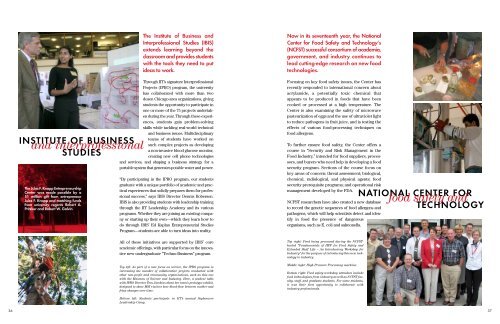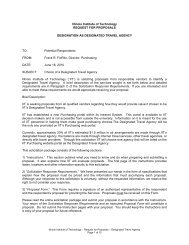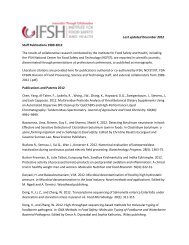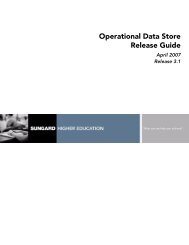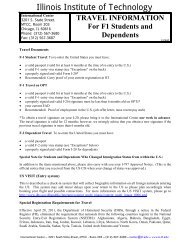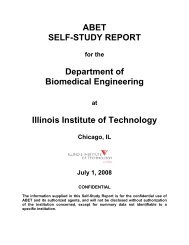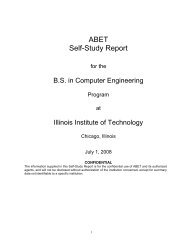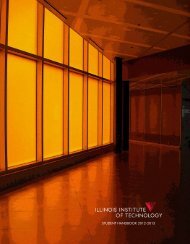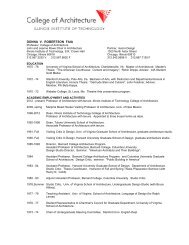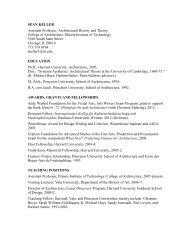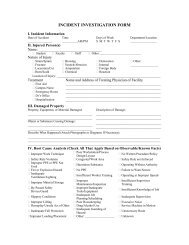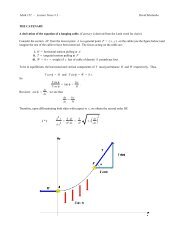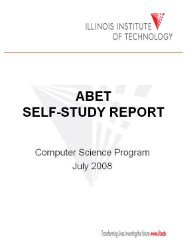breaking NEW GROUND - Illinois Institute of Technology
breaking NEW GROUND - Illinois Institute of Technology
breaking NEW GROUND - Illinois Institute of Technology
Create successful ePaper yourself
Turn your PDF publications into a flip-book with our unique Google optimized e-Paper software.
INSTITUTE OF BUSINESS<br />
and interpr<strong>of</strong>essional<br />
STUDIES<br />
The Jules F. Knapp Entrepreneurship<br />
Center was made possible by a<br />
$1 million gift from entrepreneur<br />
Jules F. Knapp and matching funds<br />
from university regents Robert A.<br />
Pritzker and Robert W. Galvin.<br />
The <strong>Institute</strong> <strong>of</strong> Business and<br />
Interpr<strong>of</strong>essional Studies (IBIS)<br />
extends learning beyond the<br />
classroom and provides students<br />
with the tools they need to put<br />
ideas to work.<br />
Through IIT’s signature Interpr<strong>of</strong>essional<br />
Projects (IPRO) program, the university<br />
has collaborated with more than two<br />
dozen Chicago-area organizations, giving<br />
students the opportunity to participate in<br />
one or more <strong>of</strong> the 75 projects undertaken<br />
during the year. Through these experiences,<br />
students gain problem-solving<br />
skills while tackling real-world technical<br />
and business issues. Multidisciplinary<br />
teams <strong>of</strong> students have worked on<br />
such complex projects as developing<br />
a non-invasive blood glucose monitor,<br />
creating new cell phone technologies<br />
and services, and shaping a business strategy for a<br />
portable system that generates potable water and power.<br />
“By participating in the IPRO program, our students<br />
graduate with a unique portfolio <strong>of</strong> academic and practical<br />
experiences that solidly prepares them for pr<strong>of</strong>essional<br />
success,” says IBIS Director Dennis Roberson.<br />
IBIS is also providing students with leadership training<br />
through the IIT Leadership Academy and its various<br />
programs. Whether they are joining an existing company<br />
or starting up their own—which they learn how to<br />
do through IBIS’ Ed Kaplan Entrepreneurial Studies<br />
Program—students are able to turn ideas into reality.<br />
All <strong>of</strong> these initiatives are supported by IBIS’ core<br />
academic <strong>of</strong>ferings, with particular focus on the innovative<br />
new undergraduate “Techno-Business” program.<br />
Top left: As part <strong>of</strong> a new focus on service, the IPRO program is<br />
increasing the number <strong>of</strong> collaborative projects conducted with<br />
other non-pr<strong>of</strong>it and community organizations, such as this one<br />
with the Museum <strong>of</strong> Science and Industry. Here, a student talks<br />
with IPRO Director Tom Jacobius about her team’s prototype exhibit,<br />
designed to show MSI visitors how blood-flow between mother and<br />
fetus changes over time.<br />
Now in its seventeenth year, the National<br />
Center for Food Safety and <strong>Technology</strong>’s<br />
(NCFST) successful consortium <strong>of</strong> academia,<br />
government, and industry continues to<br />
lead cutting-edge research on new food<br />
technologies.<br />
Focusing on key food safety issues, the Center has<br />
recently responded to international concern about<br />
acrylamide, a potentially toxic chemical that<br />
appears to be produced in foods that have been<br />
cooked or processed at a high temperature. The<br />
Center is also examining the safety <strong>of</strong> microwave<br />
pasteurization <strong>of</strong> eggs and the use <strong>of</strong> ultraviolet light<br />
to reduce pathogens in fruit juice, and is testing the<br />
effects <strong>of</strong> various food-processing techniques on<br />
food allergens.<br />
To further ensure food safety, the Center <strong>of</strong>fers a<br />
course in “Security and Risk Management in the<br />
Food Industry,” intended for food suppliers, processors,<br />
and buyers who need help in developing a food<br />
security program. Sections <strong>of</strong> the course focus on<br />
key areas <strong>of</strong> concern: threat assessment; biological,<br />
chemical, radiological, and physical agents; food<br />
security prerequisite programs; and operational risk<br />
management developed by the FDA.<br />
NCFST researchers have also created a new database<br />
to record the genetic sequences <strong>of</strong> food allergens and<br />
pathogens, which will help scientists detect and identify<br />
in food the presence <strong>of</strong> dangerous<br />
organisms, such as E. coli and salmonella.<br />
Top right: Food being processed during the NCFSThosted<br />
“Fundamentals <strong>of</strong> HPP for Food Safety and<br />
Extended Shelf Life – An Introductory Workshop for<br />
Industry” for the purpose <strong>of</strong> introducing this new technology<br />
to industry.<br />
Middle right: High Pressure Processing machine.<br />
Bottom right: Food safety workshop attendees include<br />
food technologists from industry as well as NCFST faculty,<br />
staff, and graduate students. For some students,<br />
it was their first opportunity to collaborate with<br />
industry pr<strong>of</strong>essionals.<br />
NATIONAL CENTER FOR<br />
food safety and<br />
TECHNOLOGY<br />
Bottom left: Students participate in IIT’s annual Sophomore<br />
Leadership Camp.<br />
36 37


